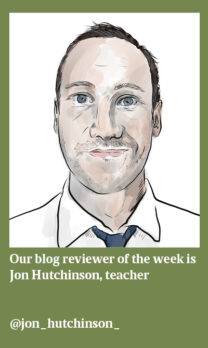Motivation and mastery: what’s the deal?
Christopher Such @suchmo83
Primary teacher Christopher Such’s biggest reflection of working with lower attaining pupils is one that will chime with anyone who has worked with children: “People hate failing at things, especially compared to their peers.” He argues that the “false gods of pace and curriculum coverage” too often leave “children to languish, their motivation sacrificed”. This blog carefully sets out a more inclusive approach to teaching and curriculum whilst explicitly renouncing the idea of lowering expectations around standards.
Co-constructing curriculum – a mission to Mars
Debra Kidd @debrakidd
It’s fascinating how recent discussion on curriculum has caused folk to focus on aspects of education that they feel have been missing. Debra Kidd argues that there is a risk that we are sidelining “the existing knowledge, interest and emotional engagement” of pupils in our quest to implement more effective educational practice. Personally, I’ve embraced the opportunity to plan a better sequenced curriculum; to teach using strategies that promote longer term retention. This means having a very clear idea of which topics are going to be learned, and setting out the exact facts within each, which will be regularly quizzed.
Perhaps this chimes with Ofsted’s vision, which Kidd describes as a “‘tabula rasa’ model” or, more humorously “a pot noodle…without the hot water”. And perhaps she is right. Regardless of whether you agree with Kidd’s analysis of Ofsted, I defy anyone to read this and not yearn desperately to be a child sitting in the sort of lesson she describes in her blog.
Dual coding and learning styles
Megan Sumeracki @DrSumeracki
Whilst it may be obvious to you that learning styles are pseudo-scientific nonsense, you may be surprised to read in this blog that a survey found 93 per cent of UK primary and secondary teachers believe in them. Why is this a problem? Well, there is a similar concept with psychological research known as “Dual Coding”. The idea behind dual coding is to combine words and visuals, such as, say, pictures, diagrams or graphic organisers, to provide different representations of the information, both visual and verbal, to help students better understand the information. A new book by Oliver Caviglioli on this issue looks set to become a huge craze in schools and to change PowerPoint presentations in lessons for ever. Megan Sumeracki teases out the difference between dual coding and learning styles in this super-accessible blogpost.
The teacher gap
Jo Facer @jo_facer
What’s the most important book on education that you’ve read this year? For English teacher Jo Facer, it is The Teacher Gap by Rebecca Allen and Sam Sims. Jo’s conclusion from reading the book is “teachers are really important to student success, and this is even more the case for disadvantaged students. We need to train them better, and we need to treat them better.” It’s a summary that is sure to please everybody and Jo outlines the practical policy recommendations set out by the book that may help us to get there. I would thoroughly recommend taking some time to delve into Facer’s previous posts; absolute gems, each and every one of them.
Is there a crisis in the use of evidence in schools?
Gary Jones @DrGaryJones
In 2011, the Education Endowment Foundation was created with the goal of improving the attainment of disadvantaged pupils through evidence-based practice; in turn, teachers and academics have worked to transform into an “evidence-based profession”. Ironic, then, that a recent RCT suggests that the Research Leads Improving Students’ Education (RISE) project seems to have had no positive impact whatsoever. In this post, Dr Gary Jones digs into the detail of the report, and offers six reasons why hope is not lost for research that seeks to improve teaching and learning.












Your thoughts